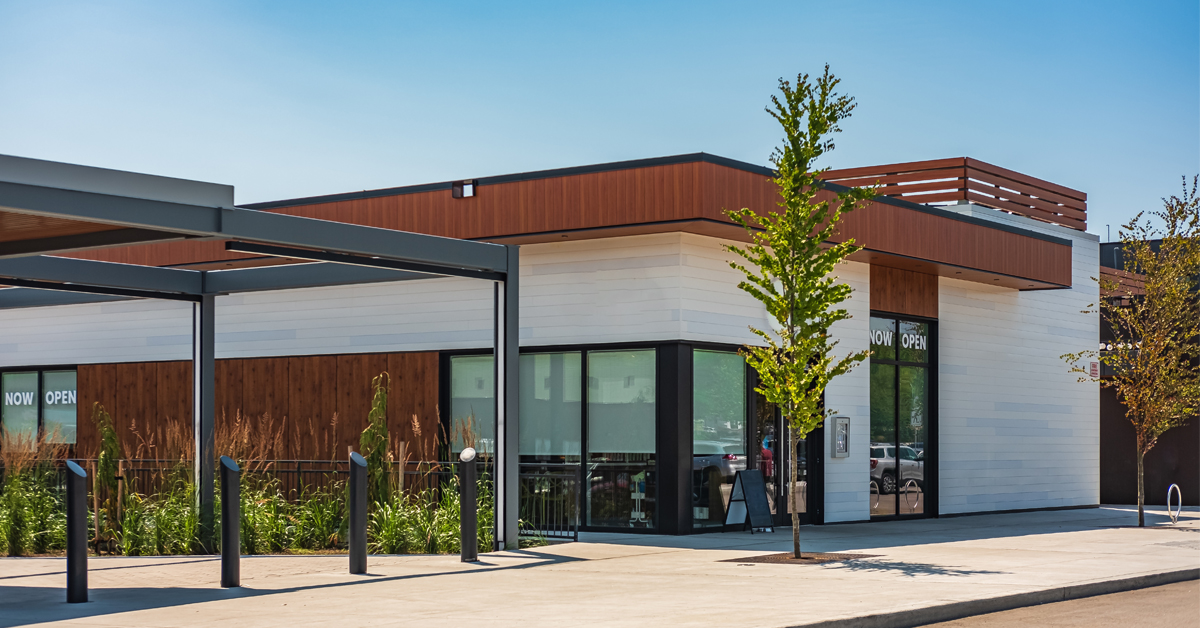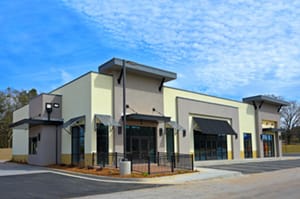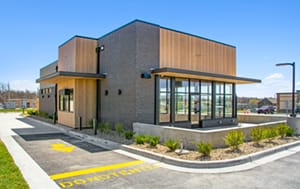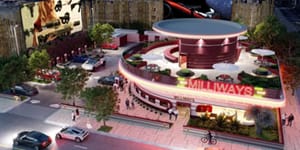
Despite rising cap rates and uncertainty about when the Fed will finally implement interest rate cuts, demand for NNN retail properties in Southern California remains robust as investors are attracted to these assets’ stable cash flow and low maintenance requirements.
“There is a huge demand for the asset class right now, as well as for sites that can be redeveloped into single-tenant properties,” says Max Stone, CCIM, a 10-year retail veteran who formed the Retail Properties Group. The platform comprises all of California, with the bulk of the business currently in SoCal, but it has recently included deals in Nevada and Arizona. Plans are to expand further into other states to support developers with a national scope.
What is a NNN (Triple Net Lease) Retail Property?
A Triple Net Lease is an agreement on a property where the tenant pays all the expenses (property taxes, building insurance, and maintenance costs) in addition to the rent. Tenants are typically pharmacies, QSRs (quick-service restaurants), bank branches, convenience stores, gas stations, automotive supply chains, and big-box stores. The properties are standalone buildings featuring one, or occasionally several, retail tenants. Although lease agreements vary, NNN properties are usually leased to strong credit tenants for 10 to 25-year terms.
 NNN properties are considered low-risk investment options that generate a stable and predictable income because rental payments are fixed and operating expenses are the tenant’s responsibility. However, there are some downsides. If a tenant vacates, the landlord may have difficulty finding a new tenant. In 2023 alone, “solid credit tenants” like Boston Market shuttered over 250 locations, Burger King closed hundreds of stores, pharmacy giant Rite Aid closed nearly 200 stores, and last week, 99 Cents Only Stores announced the closure of all 371 locations. Closures can also have an upside for owners, says Stone. In some cases, particularly for properties with A+ locations, these closures allow landlords to re-tenant with a better credit lessee.
NNN properties are considered low-risk investment options that generate a stable and predictable income because rental payments are fixed and operating expenses are the tenant’s responsibility. However, there are some downsides. If a tenant vacates, the landlord may have difficulty finding a new tenant. In 2023 alone, “solid credit tenants” like Boston Market shuttered over 250 locations, Burger King closed hundreds of stores, pharmacy giant Rite Aid closed nearly 200 stores, and last week, 99 Cents Only Stores announced the closure of all 371 locations. Closures can also have an upside for owners, says Stone. In some cases, particularly for properties with A+ locations, these closures allow landlords to re-tenant with a better credit lessee.
Returns for NNN properties may be predictable, but they’re capped, with no room during the initial term to add value. Still, NNN properties make great investments for the right kind of investor willing to do due diligence with the help of an experienced NNN retail broker. Well-selected, investment-grade retail tenants typically perform better through various economic cycles than office, industrial, or other tenant types.
Buyer Profiles
The buyer profile for NNN leased properties includes sophisticated high-net-worth investors, institutional investors, and 1031 exchange buyers seeking passive, low-risk commercial real estate investments.
“I would say that 90% of buyers for triple net properties are trading out of some labor-intensive property,” says Stone. “They’re usually looking to simplify their portfolio, and I would add that the majority of those people are selling multifamily properties. The reason buyers are still purchasing properties at these compressed cap rates is twofold: one, to avoid the tax burden (through the 1031 exchange), and two, because the properties are irreplaceable in Southern California.”
Demand Increases as Rents Escalate
 As developable land becomes more scarce in Southern California, rents for single-tenant NNN properties have skyrocketed. With the higher rents, developers are able to pay more for land. There is enormous demand for drive-through properties and, interestingly, car washes, which command some of the highest rents. “When I first started nearly a decade ago, car wash (annual) rents were in the mid-six-figure range. That crept up pretty quickly to $175,000, then we saw $200,000, and now it’s not a surprise when tenants are willing to pay $400,000 annually on a NNN basis,” says Stone.
As developable land becomes more scarce in Southern California, rents for single-tenant NNN properties have skyrocketed. With the higher rents, developers are able to pay more for land. There is enormous demand for drive-through properties and, interestingly, car washes, which command some of the highest rents. “When I first started nearly a decade ago, car wash (annual) rents were in the mid-six-figure range. That crept up pretty quickly to $175,000, then we saw $200,000, and now it’s not a surprise when tenants are willing to pay $400,000 annually on a NNN basis,” says Stone.
Drive-through QSR Expansions Driving Demand
 Much of the demand is being driven by the expansion of QSR franchises, which is expected to grow by 2.2% in 2024, according to Retail Dive, which means there will be over 4,300 franchised restaurant openings in the U.S. this year. Starbucks, the gold standard of single-tenant NNN tenants, is planning for 4% net new store growth in the United States for the 2024 fiscal year, with roughly 650 more U.S. locations. Chipotle is projecting to open around 300 additional stores this year. With the change in consumer behavior brought on by COVID, drive-throughs are propelling much of that expansion. Sites are shrinking the physical footprint of the stores and offering double and sometimes triple drive-through lanes.
Much of the demand is being driven by the expansion of QSR franchises, which is expected to grow by 2.2% in 2024, according to Retail Dive, which means there will be over 4,300 franchised restaurant openings in the U.S. this year. Starbucks, the gold standard of single-tenant NNN tenants, is planning for 4% net new store growth in the United States for the 2024 fiscal year, with roughly 650 more U.S. locations. Chipotle is projecting to open around 300 additional stores this year. With the change in consumer behavior brought on by COVID, drive-throughs are propelling much of that expansion. Sites are shrinking the physical footprint of the stores and offering double and sometimes triple drive-through lanes.
Stone says two franchises in expansion mode are creating demand in his market: Dutch Bros Coffee and Salad and Go. Dutch Bros is a publicly held chain that operates and franchises drive-thru coffee shops. It has grown to over 830 locations across 16 states (with a significant presence in California, Arizona, and Nevada) and plans to open another 150–165 this year. Salad and Go is an Arizona-based drive-thru-only restaurant chain specializing in salads, wraps, and breakfast items. It plans to open a store a week in 2024, including locations in California.
Stone says that Dutch Bros is “on a tear right now to open locations” with a goal of opening 4,000 locations. An emerging company with ambitious expansion goals often will take some less appealing sites with lower traffic counts. They may also sacrifice margins to build a presence in a new market while also paying top dollar for a grade-A site. “If they just open one store in any given market, it would create a logistical nightmare because they’re shipping goods to service one location,” says Stone.
He adds that he is seeing a lot of expansion from quick-serve restaurants in the market, “and they’re aggressively competing with one another. It’s kind of funny because we’ve seen cap rates inflate quite a bit over the last year, but pricing hasn’t seemed to vary much. It’s because rental rates are also skyrocketing due to the lack of available space.”
The demand is so high, and the supply is so constricted in the Southern California market right now that some landlords are offering tenants lucrative buyouts so that the property can be redeveloped to attract higher-paying tenants like Starbucks or a Chick-fil-A.
EV Charging Stations – the Next NNN Frontier?
 Stone predicts that EV charging stations will be an emerging concept that will impact the demand for sites for single-tenant NNN properties. Last September, Rove, a full-service charging station operator based in Southern California, broke ground on its first charging station in Santa Ana. It will include 40 charging spots, a grocery store, indoor and outdoor seating, and a car wash. Centers are also planned for Costa Mesa and Corona, with plans to open 20 by 2026.
Stone predicts that EV charging stations will be an emerging concept that will impact the demand for sites for single-tenant NNN properties. Last September, Rove, a full-service charging station operator based in Southern California, broke ground on its first charging station in Santa Ana. It will include 40 charging spots, a grocery store, indoor and outdoor seating, and a car wash. Centers are also planned for Costa Mesa and Corona, with plans to open 20 by 2026.
On a grander scale, Tesla is constructing a first-ever entertainment-centric supercharging station with a 24-hour diner and drive-in theater on Santa Monica Boulevard in Los Angeles that will play movie clips while drivers wait for their EVs to charge. “It’s an interesting concept because people can enjoy themselves while they’re having their cars charged,” says Stone.
NNN Outlook for 2024
The key takeaway is that demand for NNN retail properties and sites will remain robust for the foreseeable future. Although cap rates have increased steadily since 2022, there hasn’t been much fluctuation in pricing overall because tenants are willing to make up that difference by paying a higher rent, says Stone. Investing in NNN retail properties can be an excellent opportunity for investors looking for a long-term and stable investment that comes with reliable and consistent cash flow. While supply is limited, opportunities to acquire these assets still exist.
Contact Max Stone or associates Josh Salik and Michael Paul at Voit Real Estate Services to learn more.